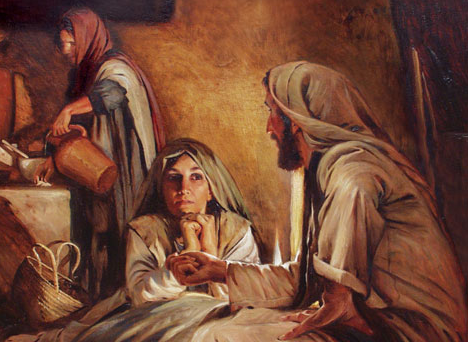 Editor’s note: The following comprises the fifth chapter, first part (A5), of The Gospel of Luke: An Exposition, by Charles R. Erdman (published 1936). All spelling in the original.
Editor’s note: The following comprises the fifth chapter, first part (A5), of The Gospel of Luke: An Exposition, by Charles R. Erdman (published 1936). All spelling in the original.
5. Martha and Mary (10:38-42)
___________________________________________________
38 Now as they went on their way, He entered into a certain village: and a certain woman named Martha received Him into her house. 39 And she had a sister called Mary, who also sat at the Lord’s feet, and heard His word. 40 But Martha was cumbered about much serving; and she came up to Him, and said, Lord, dost thou not care that my sister did leave me to serve alone? bid her therefore that she help me. 41 But the Lord answered and said unto her, Martha, Martha, thou art anxious and troubled about many things: 42 but one thing is needful: for Mary hath chosen the good part, which shall not be taken away from her.
___________________________________________________
The unfailing human interest of Luke is nowhere more perfectly expressed than by this exquisite scene in the home at Bethany. It is to be regretted that it has become the occasion for endless debate as to the relative merits of Martha and Mary. Some imagine that the former was unloving but energetic and efficient, and that the latter was affectionate, but sentimental and indolent. In reality both sisters had admirable qualities; both loved the Master and longed to please Him; but on this occasion Martha, in her very eagerness to serve, had overburdened herself in the preparation of an elaborate meal, while Mary, with truer intuition of what Jesus wished, “sat at the Lord’s feet, and heard His word.” She knew that He desired, not for His own sake, but for theirs, to reveal Himself and to deliver His heavenly message, and thus according to the fine art of hospitality, she considered first the wish of her guest and was thus doing more to entertain the Master than was her sister.
“Martha was cumbered about much serving;” she was distracted by the many things she was trying to do. It is possible for a follower of Christ to attempt too much; sometimes this is due to a sense of self-importance and of pride. It may result in such a mood of irritation and temper as was shown by Martha when in criticizing her sister she humiliated her by rebuking her in the presence of their Guest, and by addressing the remark to Him rebuked Him as well, “Lord, dost thou not care that my sister did leave me to serve alone? bid her therefore that she help me.” In His reply Jesus showed His affection by tenderly repeating her name, but He rebuked her spirit and revealed its cause, “Martha, Martha, thou art anxious and troubled about many things: but one thing is needful: for Mary hath chosen the good part, which shall not be taken away from her.” There was no need for an elaborate meal; but few things or one would have sufficed; yet one thing was needful, and that Mary had chosen, for while the Master does appreciate all that we undertake for Him, He knows that our first need is to sit at His feet and learn His will; then in our tasks we shall be calm and peaceful and kindly, and at last our service may attain the perfectness of that of Mary when in a later scene she poured upon the feet of Jesus the ointment, the perfume of which still fills the world.
(Go back to previous chapter)
(Continue to next chapter)










[…] (Go back to previous chapter) (Continue to next chapter) […]
[…] (Go back to previous chapter) (Continue to next chapter) […]